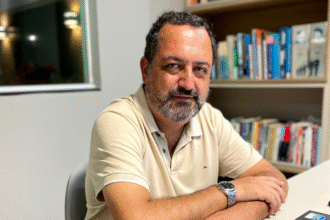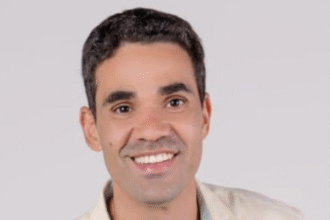In the challenging moment we live in, full of crises and uncertainties, the question arises: why does poetry still matter? It is this question that gives rise to “The poet takes the polis”, the third book by writer Teofilo Tostes Daniel. In this work, poetry is presented as an instrument of resistance and testimony, capable of dreaming of a world that celebrates human diversity.
Divided into two parts, the book initially exposes the perplexity faced with the injustices and cruelty that mark the Brazilian reality. Teofilo denounces everyday psychopathy, in which voices for help are drowned out by monetary interests. This approach aims to poke the wound and expose the evils that are often naturalized in our society.
However, the second part of the work brings a connection with hope. The author highlights the importance of sensitivity, affection and delicacy as poetic and political tools. For Tostes, art not only bears witness to extreme times, but also rescues dormant sensibilities and promotes dialogue, essential in building a better future.
“The poet takes the polis” is a source of inspiration for lovers of contemporary poetry in Brazil. The author, Teofilo Tostes Daniel, in addition to being a writer, has a degree in Editorial Production and works as a social communication analyst for the Federal Public Ministry in São Paulo. His new book is described as a project that seeks to convey health, strength and power through words.
How can poetry resist and testify in a historical moment full of challenges and urgencies?
Poetry, and art in general, help keep a look of astonishment and admiration alive and lit at the world. I believe that especially in times of crisis we need things capable of awakening questions and enchantment in our eyes. Poetry, here as a kind of quality inherent not only to the poetic genre, but to the arts in general, can serve as a counterpoint to the normalization of brutality, creating experiences that allow us to find strange creations and conceptions that perhaps seem natural to us. And in this estrangement may reside the germ of change and the necessary strength to make dreams come true.
Furthermore, literature has a strong witnessing power, since it names things. The possibility of naming our experiences has great individual and collective importance. Breaking silence pacts around violence, for example, is essential not only for the personal elaboration of an experienced trauma. This rupture helps us to see many things that are hidden, covered by the veils of this silencing, pointing out everything that is, or should be, unacceptable and non-negotiable. That’s why I also see witnessing as a crucial preventive power, leading to actions that can help us overcome atavistic challenges and find answers to the pressing questions we face.
What is the importance of human diversity in poetry and how is this celebrated in the book “The poet takes the polis”?
Diversity is an essential feature in the world, thinking here even of nature, long before there were humans on this planet. But also in the human world, which we could call culture, diversity is evident. This diversity tells us about the different responses we were able to give to crucial questions, such as survival, security and continuity, as well as certain hauntings, such as death, the origins and functioning of things in the world.
Not only from dystopias, but also from different historical experiences – some very recent and others still occurring today –, we have glimpses of what a society that does not celebrate diversity is. When we do not celebrate the diversity of ways of being, a portion of people is dehumanized and the danger is that their elimination ends up being considered normal, or even necessary. That is the basis of all genocides.
Writing allows us to be crossed by the other, who talks to us incessantly. In addition, she is also able to twist language, creating a kind of foreign language in our own language. These are two immense opportunities to realize that the other is also ourselves. And if I am able to conceive of eliminating those who don’t look like me (for whatever reasons, whatever norms I create to say who belongs to my group), it is also not impossible to think that, someone seeing me as the other, might want to eliminate me.
In my book, I celebrate diversity by opening my writing to be crossed by dissonant voices, often silenced, that orbit on the margins of almost everything. It is a work that wants “to have heard of heard / and to record all the different voices // of a Bach fugue / or an open market”.
How does the author Teofilo Tostes Daniel denounce the injustices, indifference and cruelty present in the country in his poems?
The truth in Greek is aleteia (in italics), a word formed from lete, which means forgetting, plus a particle of negation that we inherit even in Portuguese, the prefix “a”. From there, we can see that, in that language, the opposite of truth is forgetting rather than lying – and perhaps we can think of lying as a tool to keep things forgetting. And the tradition of Greek heroic poetry gave the poet the task of preserving the truth and preventing stories from falling into oblivion.
It is important that many voices witness the horror, say “I saw it”, “I felt it”, “I was there”. The power of testimony is very strong. This explains the reaction against a National Truth Commission, for example, established in our country 26 years after the end of a long dictatorship. The great power of this commission was, in the first place, in listening, creating an official space for people to tell what they experienced.
In this sense, I see that in “The poet takes the polis” my poems seek to prevent the veil of oblivion from falling over us. Especially in the first part of the book, entitled “Everyday Psychopathy”. There, I speak of love causing scandal while hate spreads, of people who need to defend the right to be what they are and of volatile death lurking, pointing out that “a final horde follows / monetizing the unacceptable / sewing eyes where they read / obscene cries for help”.

What was Teofilo Tostes Daniel’s motivation for turning his writing to the horror in which everyone was immersed during the pandemic?
We have all seen in this period thousands of families deprived of the possibility of saying goodbye to their loved ones. Bodies waiting for a grave, because the time to dig graves in cemeteries, even mass graves, was less than the atrocious speed of death. People suffocating in hospitals from lack of oxygen, their lungs taken over. We saw these same people being mocked and ridiculed, as if nothing was happening. We also saw hunger spread like another virus, spreading despair and claiming lives. The fear of death has hit us all. And the fear of losing someone we love too. In addition, there was also the fear of not even having the dignity to die. I had a friend who was intubated, struggling. I don’t forget her panicked look in the last photo she took before being sedated. We were very afraid that she would die, but thankfully she survived. But she went on to face common sequelae, after severe cases of the disease.
We live in an extremely perverse combination of a worldwide pandemic and a denialist government. Part of my generation, which grew up after the country’s re-democratization, perhaps at some point believed that democracy and certain conquered rights were guaranteed. But in this period we realized how much it is necessary to fight every day to guarantee these rights, and extend them to everyone – because, yes, there is another part of my generation to whom these rights that I speak little about have reached since 1988. impact that certain political choices have on the lives of all people.
In the face of all this, certainly the first motivation was to elaborate this horror, through writing. In addition to living and witnessing all these things, I was part of the risk group for covid. So my fear was daily. Writing was also dialoguing with this fear and saying, in some way, that I want to be alive.
I was already writing about all these issues when I realized that this movement was producing a book. At this point, it was inevitable to remember the central works of two very important authors for me, which were also produced under the impact of horror: both “A rosa do povo”, by Drummond – certainly the poet who formed me and led me to write – and “Is this a man?”, by Primo Levy. There is something in common in these two works – and in many works generated from a horror, personal or collective – of great importance for humanity. They show the power of testimony as a tool that helps to elaborate or overcome one’s own horror, becoming true health projects – individual and collective. It was through this process that my book began to take shape and now it is no longer mine alone,
In the second part of the book, how does the author express hope and what poetic and political tools does he use?
The second part, entitled “Poetic Polis”, opens with an image of the resumption of the polis. This image has a dual importance in the book. One is clearer, as it reverberates the return of the possibility of meeting, which was more restricted for some time due to the pandemic and the necessary social isolation. The other is a kind of poetic response to a passage from Plato’s book “The Republic”, in which Socrates (or rather, Plato through his master) says that in the ideal city it is absolutely necessary not to admit poetry, arguing that the The role of art would only be to copy the things of the world which, in turn, would be a copy of perfect ideas. That would make art two degrees away from the truth. “The poet takes the polis” bets on a very different path. For me,
In addition to expressing this hope in the power to narrate what was experienced, the second part of the book also celebrates the possibility, the desire for encounter, which produces the crossing of diversity. I want to witness the wonder and immense openness that the encounter with the other produces, from the place I occupy in the world, as a man with a disability.
I see that the encounter and openness to otherness allows us to look at the world in a more generous way. Developing this look recovers sensibilities dulled by the dryness of the days, which in general accept more easily or passively the normalization of certain horrors. Therefore, there is also a purpose in this book, a bet on rescuing sensitivity so that we can build a different future.
How can art, especially poetry, rescue sensibilities dulled by the dryness of the days and promote dialogue to build a new tomorrow?
As a reader, and also as a spectator of many artistic manifestations, I feel that art constantly lends me other eyes, other ways of seeing the world, other ways of inhabiting it and other ways of dreaming or reinventing it. Poetry comes from the term poiesis, which means creation, production. In this sense, I cannot help but see it as a movement, an act of creating worlds.
By making these crossings along the paths that art offers us, we rescue within ourselves the possibility of being astonished and enchanted by the world. This ‘reenchantment’ seems to me to have a lot of power to open our ears to the other. Including the other who has behaviors that my ethics considers abject. There is an American psychologist called Marshall Rosenberg, responsible for systematizing Non-Violent Communication, who said that “all violence is a tragic expression of an unmet need”. Art, especially writing, helps me a lot to understand this. The way we organize our daily lives, where everything ends up becoming an object and a commodity, crushes our sensitivity, favoring exchanges in which a lack of empathy prevails. For me, a poetry that has the political project of rescuing sensibilities necessarily involves humanizing the other and trying to understand, including the origins of certain forms of violence that end up being socially accepted. Not to justify them, but to think about ways to eradicate this violence, fostering a culture of peace that takes everyone’s needs into account to build the future.
How can the book “The poet takes the polis” inspire readers and contribute to contemporary poetry in Brazil?
My companion once said that “every book, when it is born, says what literature can be”. After I heard that from her, I could never look at a new book the same way again. I think my newborn book does that too, stating the paths I want writing to take us (me and readers).
I also think that, if one day, a poem from this book can speak to a young reader, similar to the reader I was when I started to embark on the paths of poetry, leading him to be interested in the time in which the poem was written, as soon as many poems from “A rosa do povo”, to take this example, made me feel uneasy about that terrifying period for the world, he will have already made a very significant contribution to contemporary literature in Brazil. All writing dreams of crossing the eyes of readers. This is a desire that moves me to write, especially in this book.
What are the main themes addressed in the author’s other books, in addition to “The poet takes the polis”?
In my first book, “Poemas para ser encenado”, I worked primarily on the idea of scenic games through poetry. There I gathered poems written in the first person that distance themselves from the confessional tone and assume a fictional character, often suggesting fragments of larger stories. In this first book, I create an amalgamation of characters, stretching the boundaries of literary genres, making lyric poetry a kind of dramaturgy. Looking back today, I see that the interest in human diversity, in figures of otherness, were already present there.
In my second book, of short stories, called “Tritonos – intervals of delirium”, I work on the interrelationships between art and madness. The notion of madness is presented differently in each of the three stories that make up this book. In the first, I approach ancestral madness, as a kind of possession that takes over a small town from the writings of the main character of this short story. Then, I work on the madness of normality, narrating the shock that the shy residents of a building feel when an extravagant figure moves there and wakes up the neighbors with the aromas of a night feast, which ends up awakening, in the middle of the night, the desires repressed feelings and the frustrations of all residents. And in the last story, I explore madness as a pathology that is difficult to diagnose, based on the story of a psychiatrist who begins to hear reports of people who have been to a strange and mysterious place, which looks like a kind of art installation built in an oasis in the Atacama desert, and ended up going crazy. He begins to map the place based on the interest that such reports arouse in him. In this book, my literature encounters otherness mainly through the figure of the madman, this subject so devoid of voice, to the point of being tutored – by family members, doctors or the state itself – even in his most elementary choices. Furthermore, in the exercise of emulating the speech of these people, I often ended up hallucinating the writing, in a kind of laboratory of the language of alterity. which looks like some kind of art installation built in an oasis in the Atacama desert, and they ended up going crazy. He begins to map the place based on the interest that such reports arouse in him. In this book, my literature encounters otherness mainly through the figure of the madman, this subject so devoid of voice, to the point of being tutored – by family members, doctors or the state itself – even in his most elementary choices. Furthermore, in the exercise of emulating the speech of these people, I often ended up hallucinating the writing, in a kind of laboratory of the language of alterity. which looks like some kind of art installation built in an oasis in the Atacama desert, and they ended up going crazy. He begins to map the place based on the interest that such reports arouse in him. In this book, my literature encounters otherness mainly through the figure of the madman, this subject so devoid of voice, to the point of being tutored – by family members, doctors or the state itself – even in his most elementary choices. Furthermore, in the exercise of emulating the speech of these people, I often ended up hallucinating the writing, in a kind of laboratory of the language of alterity. this subject so devoid of voice, to the point of being tutored – by family members, doctors or the state itself – even in his most elementary choices. Furthermore, in the exercise of emulating the speech of these people, I often ended up hallucinating the writing, in a kind of laboratory of the language of alterity. this subject so devoid of voice, to the point of being tutored – by family members, doctors or the state itself – even in his most elementary choices. Furthermore, in the exercise of emulating the speech of these people, I often ended up hallucinating the writing, in a kind of laboratory of the language of alterity.
I also have short stories and poems published in some collections and literary magazines, which end up forming an overview of the main themes of interest that cross my literature, such as the celebration of otherness, writing as a space for political construction, the connections between artistic manifestations and the use of language as a possibility to expand ourselves, individually and collectively, beyond our limitations..
How did his background in Editorial Production and his work as a social communication analyst at the Federal Public Ministry influence Teofilo Tostes Daniel’s writing?
My education in editorial production greatly accentuated a trait that I already had even before entering college, which is writing with projects in mind, and books to come. It’s rare for me to write texts, whether short stories or poems, disconnected from a book project. This way of thinking about projects and fitting my writings into them was greatly strengthened by my training.
Regarding the Federal Public Prosecutor’s Office, my position ends up allowing me to get in touch with the main themes worked on by this institution. And the work of the MPF is quite diverse, with a strong emphasis on the defense of minorities, citizenship, the environment and the right to a transitional justice that rescues the right to memory and truth, seeking to punish the state or its agents. for crimes committed during the dictatorship. Working to disseminate these themes deeply contaminates, in a very positive sense, my writing and the themes that cross it.
I also think that my work in the Public Ministry’s communication and my work with literature keep a kind of mirroring, performing complementary movements with language, although in opposite directions. While at the MPF my objective is to make information encoded by technical language and legal jargon accessible to all people through a simpler and more common language, in literature I appropriate everyday events and transport them to the literary space, where I can explore its complexity, breaking it down or adding new layers.
What does the author hope to convey to readers through “The poet takes the polis” in terms of health, strength and potency through words?
Essentially, I would like to encourage in each male and female reader the desire to take the polis with their voice, to narrate their stories with the strength of someone who says: I exist and I am here. There is an important French philosopher of the 20th century, called Gilles Deleuze, who wrote that “health as literature, as writing, consists of inventing a people that is lacking”. This is because, when we take possession of the fabulating function of writing, within the perspective that he calls minor literature – which I see as a literature that circulates on the margins of power, always ready to appropriate itself –, one no longer writes. only with your own memories. The power of literature and the memories it moves, in this perspective, is to become a space for the collective destination of a people to come. Not a people called to rule the world, but a lesser people,
This minor literature also produces its effects in language, opening paths for a foreign language to inhabit the language itself. Thus, I would like each poem in this book of mine to resound as an invitation to those who read me, not only to take the polis, but also the words themselves to the point of subverting them and appropriating themselves.
Follow Teofilo Tostes on Instagram





